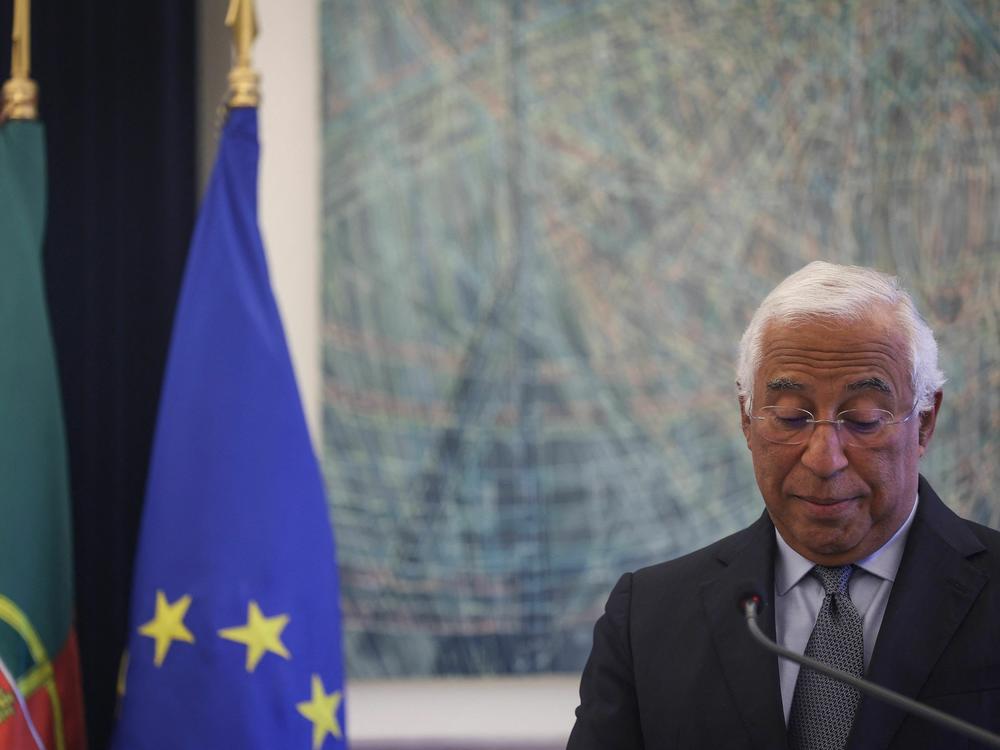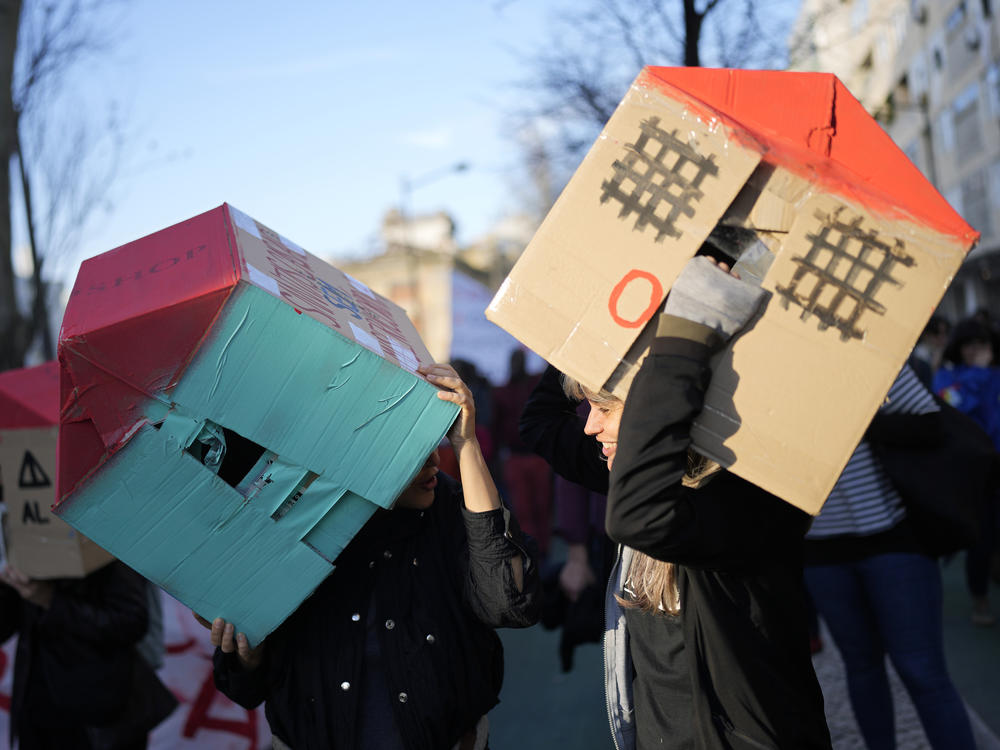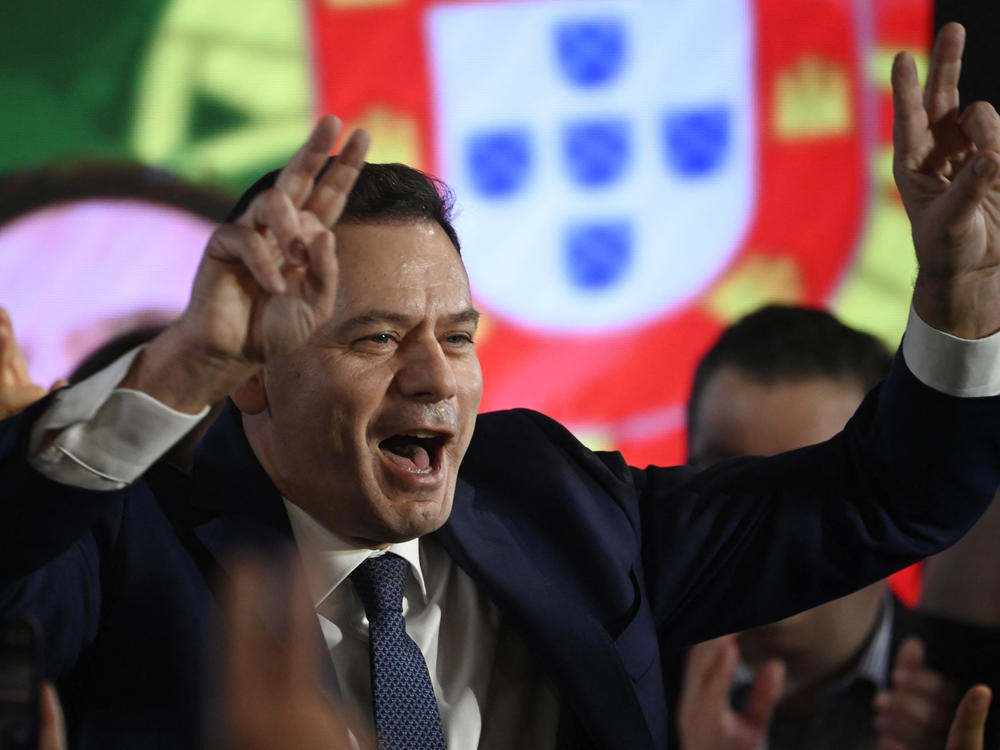Section Branding
Header Content
In Portugal, an election results in uncertainty and the rise of the far right
Primary Content
SEVILLE, Spain — A lightly regarded Portuguese political party barely five years old finds itself in a position to play kingmaker in the wake of national elections that failed to propel either of the two establishment parties into power.
That is after voters went to the polls in Portugal last weekend to elect all 230 members of the national Parliament. Going into the election, polls predicted a narrow win for the conservative party, over the ruling Socialist party. And narrow, it was.
Portugal's center-right Democratic Alliance (AD) obtained 79 seats in the Parliament, which has to elect a new prime minister. The center-left Socialist Party got 77 seats. There are still four seats up for grabs, from voters living abroad, but those are unlikely to flip the balance of power in this newly elected parliament.
Regardless of what the final count is, a third party — called Chega — is celebrating, even though it has no real chance to elect its larger-than-life leader as Portugal's prime minister.
To understand last weekend's general election in Portugal, we need to go back in time.
Recent corruption scandals rock establishment parties
In 2021, after an internal disagreement in the ruling coalition of progressive parties failed to approve a new budget for the upcoming year, the President of Portugal called general elections, which took place in January of 2022. Polls back then did not predict a conclusive victory for any of the two major parties, which have been alternating in power for the past decades. But to the surprise of many, the Socialist Party of Antonio Costa won an absolute majority. It would not need to form a coalition; it could govern on its own.
Corruption has been a main concern in Portugal for years, with both major parties tainted by charges of graft and cronyism. But last November a new case of corruption was exposed that appeared to exhaust the patience of Portuguese citizens.
It was in November when the public prosecutor's office ordered searches at multiple locations, including the then-prime minister's residence, says Liliana Borges, a political reporter at the Portuguese newspaper Público in Lisbon. The ruling Socialist Party had been in power for about eight years. Its leader, Antonio Costa, had an ideal scenario, enjoying an absolute majority in the national assembly he had earned at the previous year's general election.
Borges says prosecutors were investigating possible corruption in the handling of government appointed energy projects, and those searches resulted in the arrest of the chief of staff of the prime minister. Investigators also found about 75,000 euros (about $82,000) between books, in the chief of staff's bookshelves. The discovery kicked off an investigation into the Socialist Party's government cabinet of Prime Minister Antonio Costa.
Costa's name was mentioned in phone calls recorded during the investigation, says Tereixa Constenla, a correspondent in Portugal for the Spanish newspaper El País. Costa subsequently resigned on Nov. 7, 2023. At the time, the president of the republic could have tried to continue the Socialist Party's mandate, with an alternate prime minister. But instead, Marcelo Rebelo de Sousa called for anticipated general elections, setting off a scenario that now seems more uncertain than ever before.
Antonio Costa, the former Socialist Prime Minister, has not actually been formally accused and he may never be accused of any corruption charges, Constenla says, adding a twist to a story that is anything but predictable, and opening the door to Costa returning to public office in the future.
The rise of a third party as Portugal faces many challenges
Fast forward to today: four days after the general election, Portuguese citizens face a great deal of uncertainty. And not just because the two major parties failed to win a conclusive majority, but because Chega – has appeared on the scene with shocking results.
Constenla says Chega – Portuguese for "enough" – is an anti-establishment party that aspires to change the established political order. Members of this far-right party, which is only five years old and had no significant impact in national politics before last weekend's elections, were hoping for the kind of election results that would turn its leader, André Ventura, into a real player in politics.
Chega is really a one-man party, says Borges, the Portuguese journalist. Ventura came out of the major conservative party and is a larger than life far-right candidate, and Borges calls Chega an "extremely populist" party that claims to be able solve the corruption problems that Portugal has.
But corruption is hardly the only issue that Portugal is dealing with at the moment. Costa did not leave behind a bad economic situation, says Constenla. In fact, unemployment in Portugal is under 7%, a good number compared to previous rates in the country. The deficit is now less than the national gross domestic product, and inflation, which has been a problem across Europe, appears to be under control in Portugal, at under 3%.
But the Portuguese face two economic issues: a housing crisis due to high prices of rentals, and low salaries for a vast majority of workers.
Lisbon is one of the most expensive cities in Europe to rent. And the average monthly salary, before taxes, is around 1,500 euros (about $1,600), barely enough to rent a one-bedroom apartment in the capital. Constenla says housing prices are pushing the middle class outside of the cities, a difficult new reality for them. She also points at what some see as a coming crisis in the universal education and health care systems, which have traditionally been pillars of society in Portugal.
That is the context in which Chega is attempting to break the two-party system. Prior to last weekend's elections, its best election results earned it 12 seats in the national parliament two years ago. Chega did not have a real chance to win the election this past weekend, but on Sunday night the party won a whopping 48 seats in the national parliament. That means the far right now holds the key to a coalition government with the traditional conservatives.
That is, if the conservatives change their stated position. AD's leader, Luís Montenegro, had stated his position before the election, and he has repeated it after the election: He will not govern with Chega.
Portugal faces unpredictability in its national politics
But as early as Sunday night, Chega's Ventura was pressuring the conservatives. "This is the night that ends the two-party system in Portugal," he said, adding that the vote had resulted in "a clear majority in parliament for Chega and the conservatives together." In a parliamentary system, members of the national assembly elect a prime minister, who then forms a government. If the conservatives use the support of Chega to elect a prime minister, Ventura is expected to ask for something in return, and that would likely be cabinet positions in the national government.
Chega campaigned on a platform that included controversial proposals, such as the approval of life sentences, and chemical castration for rapists. His campaign featured anti-immigrant and anti-LGBTQ rhetoric, a defense of Portuguese Catholic traditions, and expressed a melancholy for Portugal's past dictatorship. But its main theme has been the fight against corruption. Chega claimed, as other far-right parties in Europe have, that they will end corruption and politics as usual.
Ventura sings, dances, rallies the crowds with outlandish statements, and loyalty to him is absolutely paramount to members of his party. In this way, he is comparable to Argentina's President Javier Milei, or former U.S. President Donald Trump. But this week, in the wake of the election, Ventura has come out to show a more moderate version of himself and his party. He says he is willing to be flexible, in order to govern. And he also issues a warning to the conservatives: "If you don't negotiate with us, we will not support your national budget."
The situation in Portugal after the election could hardly be more uncertain, says Constenla, the El País correspondent in Lisbon. Montenegro, the conservative leader, could become prime minister without Chega's support, but he could not pass the national budget later this year without the support of the far right, or the Socialist Party. Such a scenario would most likely lead Portugal to new elections, as happened in 2021.
But political positions can change, and there is precedent in other European countries, such as neighboring Spain, of regional alliances between the traditional conservative party and the far-right in order to govern, and above all in order to avoid repeat elections. As voters can, and often do, punish parties that prioritized individual interests over the mandate of the people at the polls to reach an agreement and govern.




